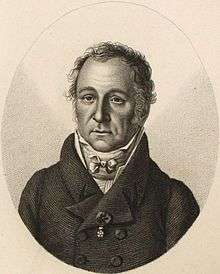Old University of Leuven
The Old University of Leuven (or of Louvain) is the name historians give to the university, or studium generale, founded in Leuven, Brabant (then part of the Burgundian Netherlands, now part of Belgium), in 1425. The university was closed in 1797, a week after the cession to the French Republic of the Austrian Netherlands and the principality of Liège (jointly the future Belgium) by the Treaty of Campo Formio.
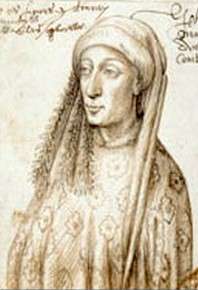
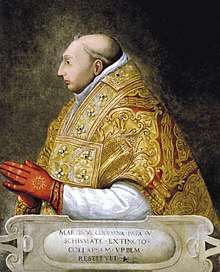

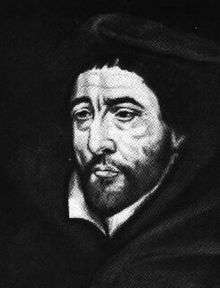
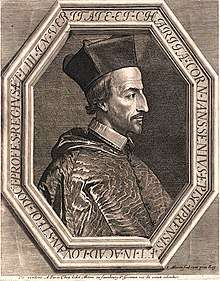

Universiteit Leuven Université de Louvain | |
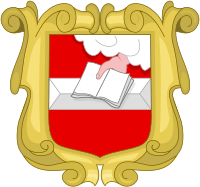 Coat-of-arms of the old University of Louvain[1] | |
| Latin: Studium Generale Lovaniense ; Academia Lovaniensis ; Universitas Lovaniensis | |
| Active | 1425–1797 |
|---|---|
| Location | , |
The name was in medieval Latin Studium generale Lovaniense[5] or Universitas Studii Lovaniensis,[6] in humanistical Latin Academia Lovaniensis,[7] and most usually,[8] Universitas Lovaniensis,[9] in Dutch Universiteyt Loven[10] and also Hooge School van Loven.[11]
It is commonly referred to as the University of Leuven or University of Louvain, sometimes with the qualification "old" to distinguish it from the Catholic University of Leuven (established 1835 in Leuven). This might also refer to a short-lived but historically important State University of Leuven, 1817–1835. The immediate official and legal successor and inheritor of the old University, under the laws in force in 1797, was the École centrale de Bruxelles, which itself closed down in 1802.
During the seventeenth and eighteenth centuries, the University of Leuven was until its closure a great centre of Jansenism[12] in Europe, with professors such as Cornelius Jansen, Petrus Stockmans, Johannes van Neercassel, Josse Le Plat and especially Zeger Bernhard van Espen and his famous disciple Johann Nikolaus von Hontheim under the pseudonym Febronius. To shake off this reputation,[13] the faculty of theology thrice declared its adherence to the papal condemnation of Jansenist beliefs in the papal bull Unigenitus (1713).[14]
History
In the 15th century the civil administration of the town of Leuven, with the support of John IV, Duke of Brabant,[15] a prince of the House of Valois, made a formal request to the Holy See for a university.[16]
Pope Martin V issued a papal bull dated 9 December 1425 founding the University in Leuven as a Studium Generale. This university was institutionally independent of the local ecclesiastical hierarchy.
From the founding of the university to its abolition in 1797, Latin was the sole language of instruction.[17]
In its early years, this university was modelled on those of Paris, Cologne and Vienna. The university flourished in the 16th century due to the presence of famous scholars and professors, such as Adriaan Florenszoon Boeyens (Pope Adrian VI), Desiderius Erasmus, Johannes Molanus, Joan Lluís Vives, Andreas Vesalius and Gerardus Mercator.
In 1519, the Faculty of Theology of Leuven, jointly with that of the University of Cologne, became the first institution to condemn a number of statements drawn from Martin Luther's Ninety-five Theses (preceding the papal bull Exsurge Domine by several months).[18]
After the French Revolutionary Wars, by the Treaty of Campo Formio, the Austrian Netherlands was ceded to the French Republic by Austria in exchange for the Republic of Venice. Once formally integrated into the French Republic, a law dating to 1793 mandating that all universities in France be closed came into effect.[19] The University of Leuven was abolished by decree of the Département of the Dyle on October 25, 1797.[20]
What remained of the university's movables and books were requisitioned for the École centrale in Brussels.[21] This was the immediate official and legal successor and inheritor of the old University, under the laws in force at the time. It was in turn closed down in 1802.
Subsequent institutions
The first attempt to found a successor university in the nineteenth-century was the State University of Leuven, 1817–1835, where a dozen professors of the old University taught.[22] This was followed by a private Catholic university,[23] the Catholic University of Leuven, established in Leuven in 1835 (initially the Catholic University of Mechlin, 1834–1835). This institution was founded with the intention of restoring the confessionally Catholic pre-Revolutionary traditions of learning in Leuven.[24][25] In 1968 this split to form the two current institutions: the Dutch language Katholieke Universiteit Leuven and the French language Université catholique de Louvain.
The library
From the founding of the University in 1425 up until 1636, there was no official library of the university. Very likely the students had access to manuscripts and printed books preserved in the homes of their professors or colleges.
In 1636, however, a university library was founded in the Cloth hall, previously the seat of the cloth weavers’ guild,[26] and was enlarged in 1725 in a baroque style.
In 1797 much of what remained of this library after the depredations of the French occupying forces was sent to the École centrale de Bruxelles, established as the official replacement of the abolished university, although its most precious books and manuscripts were deposited in Paris at the Bibliothèque nationale de France.[26] The library of the Central School of Brussels came to number about 80,000 volumes, which later became part of the Library of Brussels, and then the Royal Library of Belgium. When invading German forces burned Leuven university library at the beginning of the First World War, it did not contain the books of the old university, or of the State University, but only those of the 19th-century Catholic University of Leuven. Nonetheless, some 300,000 "invaluable books" were lost.[26] This act was used for anti-German propaganda and, a new larger library was built in 1928 funded largely by the Belgian Relief Fund initiated by Herbert Hoover.[26]
The archives
The rich archives of the old University of Leuven, after its suppression by the law of the French Republic, so as all the other Universities of the French Republic, were transferred to a "Commission in charge of the management of the goods of the abolished university in Leuven", set up in 1797 and active until 1813.[27] They passed to the National Archives of the United Kingdom of the Netherlands and ultimately to the National Archives of Belgium.
Although the archives of the old University of Leuven have been recognized as world heritage[28] by UNESCO, until today there is no complete history of the old University of Leuven.[29]
List of Colleges
Chronological list of colleges by foundation, the oldest 4 (Castle/Pork/Lely and Faulcon) were considered as Grand College.[30] in the early 18th century there were 18 colleges.[31]
| Foundation | Name | Remarks | |
|---|---|---|---|
| 1. | 1431 | Grand College de Burcht | founded by Godfrey de Goimpel |
| 2. | 1430 | Grand College het Varken | foundation by Henri de Loë |
| 3. | 1493 | Grand College de Lelie | foundation by Charles Viruli |
| 4. | 1546 | Grand College de Valk | foundation by Guillaume Everaerts |
| 5. | 1442 | Grand College of Theology | Foundation by Louis de Rycke |
| 6. | 1662 | Minor College of Theology | |
| 7. | 1483 | College of Saint-Yvo | Foundation by Robert van den Poele |
| 8. | 1484 | College of Saint-Donatian | Foundation by Antoine Haveren |
| 9. | 1499 | Houterlé-College | Foundation by Henry of Houterlé |
| 10. | 1504 | Winckele-College | Foundation by Jean de Winckele |
| 11. | 1509 | Arras-College | Foundation by Nicolas Ruistere |
| 12. | 1490 | Standonck-College | Foundation by Jean Standonck |
| 13. | Three Tongues-College | Foundation by Jerome of Buyslede | |
| 14. | 1523 | Pontifical College | Foundation by Adrian VI |
| 15. | 1535 | Saint-Anne's College | Foundation by Nicolas Goublet |
| 16. | 1551 | Savoye's College | Foundation by Eustache Chapuis |
| 17. | 1559 | Druite College | Foundation by Michel Druite |
| 18. | 1569 | van Daele's College | Foundation by Peter van Daele |
| 19. | 1569 | Viglius' College | Foundation by Viglius ab Aytta Zuichemus |
| 20. | 1574 | Craendonck College | Foundation by Marcel Craendock |
Related People
List of Chancellors
Chronlogical list of Chancellors.[31]
| Begin | End | Name | Remarks | |
|---|---|---|---|---|
| 1. | 1426 | 1477 | Guillaume van de Noot d'Assche | Dean of St-Peters in Leuven |
| 2. | 1477 | 1487 | Dominic de Bassadonis | Dean of St-Peter |
| 3. | 1487 | 1509 | Nicolas de Ruistere | Arch-deacon of Brabant |
| 4. | 1509 | 1532 | Conrard von Ghingen | Herzog von Brunswick |
| 5. | 1532 | 1593 | Rogier, prinz von Taxis | Protonotary in Antwerp |
| 6. | 1593 | 1619 | Georg of Austria | Grandson of the emperor Maximilian |
| 7. | 1619 | 1634 | Gajus Anthoine Hopperus | |
| 8. | 1634 | 1659 | François-Jean de Robles | bishop of Ypres |
| 9. | de Spinola | |||
| 10. | 1666 | Charles Hovius | President of the Privy Council | |
| 11. | 1666 | don Eugenio de Velasco | ||
| 12. | 1692 | Ferdinand-François de Trazignies | Bishop of Tournay | |
| 13. | 1692 | 1734 | Alexius-Antoine, Prince of Nassau-Siegen | Titular Archbisshop of Trapezopolis |
Notable alumni and faculty members

_(1856).png)
Notable alumni and faculty members of the pre-1797 University of Leuven include:
- Rudolph of Beringen (active 1420–1459), professor of canon law
- Jan Standonck (1454–1504), Master of the Collège de Montaigu in Paris
- Adriaan Floriszoon Boeyens (1459–1523), Pope Adrian VI
- Desiderius Erasmus (1466–1536), humanist
- Damião de Góis (1502-1574), Portuguese humanist, philosopher
- Johannes Sturm (1507–1589), German educator
- Gerard Mercator (1512–1594), cartographer
- Michael Baius (1513–1589), theologian
- Andreas Vesalius (1514–1564), father of modern anatomy
- Rembert Dodoens (1517–1585), botanist
- Antoine Perrenot de Granvelle (1517–1586), cardinal, statesman
- Wilhelmus Damasi Lindanus (1525–1588), Bishop of Roermond and Gent, author
- John Dee (1527–1608 or 9), mathematician, astronomer, astrologer, occult philosopher, imperialist and adviser to Queen Elizabeth I
- Petrus Peckius the Elder (1529–1589), law professor
- Blessed Diarmaid Ó hUrthuile, or Dermot O'Hurley (c. 1530–1584), Archbishop of Cashel, Roman Catholic martyr
- Willem Hessels van Est (1542–1613), biblical scholar
- Justus Lipsius (1547–1606), philologist
- Leonardus Lessius (1554–1623), Jesuit moral theologian
- Petrus Peckius the Younger (1562–1625), diplomat and chancellor of Brabant
- Aubert Miraeus (1573–1640), ecclesiastical historian
- Jacobus Boonen (1573–1655), Archbishop of Mechelen
- Adriaan van den Spiegel (1578–1625), anatomist and botanist
- Lawrence Beyerlinck (1578–1627), encyclopedist
- Nicolaus Vernulaeus (1583–1649), Latin playwright
- Abbé de Saint-Cyran (1583–1643), French ecclesiastic
- Cornelius Otto Jansen (1585–1638), father of Jansenism
- St Robert Bellarmine (1569–1576), Cardinal, Jesuit theologian.
- John of St. Thomas (1589–1644), theologian and philosopher
- John Sinnich (1603-1666), Irish born, professor of theology
- Marcin Kalinowski (c. 1605–1652), Polish nobleman
- Łukasz Opaliński (1612–1666), political writer
- Franciscus Deurweerders (c. 1616–1666), founder of the Confraternity of the Cord of Saint Thomas
- Cornelis de Bie (1627 – c.1715), Flemish rhetorician
- Joannes Roucourt (1636–1676), parish priest and theologian
- Francis Martin (1652–1722), Irish controversialist
- Edward Ambrose Burgis (c.1673-1747), historian and theologian
- Febronius (1701–1790), historian and theologian
- Charles Nerinckx (1761–1824), founder of the Sisters of Loretto
- Jean-Baptiste van Dievoet (1775-1862), Licentiatus in both laws
See also
- Academic libraries in Leuven
- Catholic University of Leuven
- Catholic University of Mechlin
- Collegium Trilingue
- Faculty of Theology, Old University of Leuven
- Katholieke Universiteit Leuven
- List of colleges of Leuven University
- List of medieval universities
- State University of Leuven
- Université catholique de Louvain
- Universities in Leuven
Notes
- Marc Nelissen, "Leuven, Rome en Brabant", in Nelissen, Roegiers and Van Mingroot, De stichtingsbul van de Leuvense universiteit, 1425-1914, Leuven, 2000, p 70: "de universiteit voerde het stadswapen van Leuven, een dwarsbalk van zilver op een veld van keel, maar voegde in de rechter bovenhoek van het schild een nimbus toe van waaruit een hand een opengeslagen boek aanreikte."
- Nicolaus Vernulaeus, Academia Lovaniensis, Louvain, Petrus Sassenus, edition of 1667, p. 1.
- Georgius Hagelgans, Orbis literatus academicus Germanico-Europaeus, Francfort, 1737, in-fol., p. 30.
- Paul Duchaine, La franc-maçonnerie belge au XVIIIe siècle, Brussels, 1911, p. 103: " dans la suite plusieurs professeurs (de Louvain) et plusieurs étudiants se firent encore initier aux mystères maçonniques, Fery (N. B. Martin François Joseph Fery, professeur de philosophie à Louvain) et Lambrechts, Verhulst et Van der Stegen notamment" et Adolphe Cordier, Histoire de l'ordre maçonnique en Belgique, Mons, 1854, p. 337: "Tableau des membres de la loge la Vraie et Parfaite Harmonie à Mons: 117: Lambrechts, professeur de droit à l'université de Louvain, Init., 1778".
- In the act of approbation of Pope Martin V : "Generale literarum Studium in eodem Oppido ordinari desiderant" et "in dictis Studiis generalibus".
- ibidem : "Rector Universitatis Studii".
- For example : Nicolaus Vernulaeus, Academia Lovaniensis. Ejus origo, incrementum, viri illustres, res gestae, Lovanii, 1627 or Privilegia Academiae Lovaniensis per Summos pontifices et Supremos Belgii Principes concessa, Lovanii, apud Aegidium Denique, 1728.
- Rector et Universitas Lovaniensis.
- For example: Œuvres complètes de Bossuet, : publiées par F. Lachat, Louis Vivès, Paris, 1864 : p. 247 : "Epistola LXV RECTOR ET UNIVERSITAS LOVANIENSIS AD BOSSUETUM", or : Jean-François Van de Velde, Nova et absoluta collectio synodorum, 1829, p. 171 : seu in Universitatibus, praecipuè Lovaniensi, alios non habuisse Magistros, quam errorum similium osores, de quo omnibus Dioecesanis praecipua, et communis debet esse vigilantia : sanè famosa Universitas Lovaniensis".
- For example : Privilegia Academiae Lovaniensi per summos pontifices ..., Louvain, 1728, p. 95 : " Gesien het voorschreven Advies, wiert versoght Advies vanden Conservateur vande Privilegien der Universiteyt Loven", or, J.B. Lameere, Beschryf van oud en nieuw Loven, gevolgd van de lyst der primussen van de oude Universiteyt Loven, 1829.
- For example : Beschryving der stadt Schoonhoven, 1762, p. 458 : "De bovengenoemde Heer (....) stigte in het jaar 1557 twee Beursen in de Hooge School van Loven".
- H. Francotte, La propagande des encyclopédistes français au pays de Liège, p. 28: "le jansénisme règnait en maître à l'université de Louvain".
- Leuven University, Leuven University Press, p. 153: " In 1698 a clandestine group of anti-Jansenists was formed, mainly of Jesuits and regular clergy, and it denounced the University of Louvain to Rome as 'a hide-out of Jansenists' "
- Toon Quaghebeur, "The Reception of Unigenitus in the Faculty of Theology at Louvain, 1713-1719", The Catholic Historical Review 93:2 (2007), pp. 265-299.
- Jan Roegiers et al., "The Old University 1425-1797", in Leuven University, Leuven, Leuven University Press, 1990, p. 57: "The town had promised Pope Martin V that it would provide the University with premise". ...."The municipality also undertook to pay for the repair, maintenance and extension of the four paedagogies", p. 36 "The Bull of Foundation in 1425 had made finance and appointment of professors a matter for the Civil authorities: the town gave the University its site and paid its professors", and p. 43: "On 20 June 1425 the Louvain magistrates agreed to engage the doctors, masters and other persons needed for the studium".
- (Jan Roegiers et al.), "The Old University 1425-1797", in Leuven University, Leuven, Leuven University Press, 1990, p. 21: "These universities (the medieval universities) were created either by sovereign princes or by towns, and were confirmed by the Pope", and further: "The foundation of Louvain was the work of both ducal and municipal authorities. John IV, the Duke of Brabant, encouraged by two of his concillors, Engelbert van Nassau and Edmund van Dynter, strongly favoured the establishment of a higher centre of learning in his dukedom".
- Jozeph IJsewijn, Companion to Neo-Latin Studies, Amsterdam-New-York-Oxford, 1977, p. 102: "Latin survived as the language of the University of Louvain until the French Revolution but the abolition of this institution (1797) was a catastrophe for Latin in the Southern Netherlands".
- Richard Marius, Martin Luther: The Christian between God and Death (1999), p. 188.
- The law of 15 September 1793 had decreed the suppression of all the colleges and universities in France, but the universities remain de facto until the new law of 7 ventôse year III (25 February 1795) creating the Écoles centrales. In accordance with this law the University of Louvain was abolished by Decree of the Departement of the Dijle. Louis Trénard, De Douai à Lille, une université et son histoire, Presses Universitaires du Septentrion, 1978, p.37 note 6.
- Jan Roegiers et al., Leuven University, Leuven, Leuven University Press, 1990, p. 31: "With the Law of 3 Brumaire of Year IV, which reorganized higher education in the French Republic, there was no place for the University of Louvain, and it was abolished by Decree of the Departement of the Dijle on 25 october (1797)".
- Leuven University, p. 31: "The university colleges were closed on 9 November 1797, and all items of use, with all the books, were requistionned for the new École Centrale, in Brussel". And also: Analectes pour servir à l'histoire de l'Université de Louvain, edited by P. F. X. De Ram, Leuven, 1840, library Vanlinthout en Vandenzande, vol. 3, p. 58, footnote 1: "De La Serna Santander fut spécialement chargé de faire transférer à Bruxelles les principaux ouvrages de la bibliothèque académique qui déjà, en 1794 et 1795, avait été spoliée par les commissaires français."
- Arlette Graffart, "La matricule de l'Université de Louvain (1817-1835)", in Album Carlos Wyffels, Brussels, 1987, p. 177. Arlette Graffart says that : « l'Université d'État de Louvain mérite bien plus que l'Université catholique de Louvain d'être considérée comme la "résurrection" de l'Ancienne université de Louvain.
- R. Mathes, Löwen und Rom. Zur Gründung der Katholischen Universität Löwen unter besonderer Berücksichtigung der Kirchen-und Bildungspolitik Papst Gregors XVI, Essen, 1975.
- Herbermann, Charles, ed. (1913). . Catholic Encyclopedia. New York: Robert Appleton Company.
- Note that the Court of Cassation of Belgium ruled that the two entities were legally separate. 26 November 1846: "The Catholic University of Leuven can not be regarded as continuing the old University of Leuven", in, Table générale alphabétique et chronologique de la Pasicrisie Belge contenant la jurisprudence du Royaume de 1814 à 1850, Brussels, 1855, p. 585, column 1, alinea 2. See also: Bulletin Usuel des Lois et Arrêtés, 1861, p.166.
- Wuyts, Jolan (October 2019). "Leuven's University Library: Risen from the ashes". Europeana (CC By-SA). Retrieved 2019-10-10.
- "Commissie beslast met het beheer van de goederen van de afgeschafte universiteit te Leuven" .
- UNESCO, Memory of the World : the Archives of the University of Leuven (1425-1797): University Heritage of Global Significance
- Already in 1927 Léon van der Essen wrote in L'Université de Louvain, Liège, La Pensée catholique, 1927, p. 30 : « Nous ne pouvons songer à donner une idée relativement complète des mérites et des gloires de l'ancien Studium Generale brabançon : cette histoire n'a jamais été écrite et nous ne pouvons la résumer ici »
- "College De Valk: geschiedenis". www.law.kuleuven.be. Retrieved 23 March 2018.
- Supplement aux trophees tant sacres que profanes du Duche de Brabant (etc.): 3-4
Bibliography
- 1627: Nicolaus Vernulaeus, Academia Lovaniensis. Ejus origo, incrementum, viri illustres, res gestae, Louvain, 1627.
- 1635: Valerius Andreas, Fasti academici Lovanienses, Louvain, edited by Jean Olivier et Corneille Coenesteyn, 1635.
- 1829: Baron Frédéric de Reiffenberg, Mémoires sur les deux premiers siècles de l'Université de Louvain, Brussels, 1829-35.
- 1838: P. De Ram, Laforêt et Namêche, "Analectes pour servir à l'histoire de l'Université de Louvain", in, Annuaire de l'Université de Louvain, 1838-65.
- 1856: F. Nève. Mémoire historique et littéraire sur le collège des Trois-langues à l'Université de Louvain, Brussels, 1856.
- 1881: Edmond Reusens, Documents relatifs à l'histoire de l'Université de Louvain (1425-1797), in Analectes pour servir à l'histoire ecclésiastique, t. XVII and sequents, 1881-92.
- 1881: P. De Ram, Codex veterum statutorum Academiae Lovaniensis, Brussels, 1881.
- 1884: Arthur Verhaeghen, Les cinquante dernières années de l'ancienne Université de Louvain, Liège, 1884.
- 1945: Léon van der Essen, L'université de Louvain, Brussels, 1945.
- F. Claeys Boúúaert, L'Ancienne Université de Louvain, Études et Documents, Louvain 1956.
- 1959: F. Claeys Boúúaert, Contribution à l'histoire économique de l'Ancienne Université de Louvain,1959.
- 1977: Claude Bruneel, Répertoire des thèses de l'Ancienne Université, Louvain,1977.
- 1990: Emiel Lamberts et Jan Roegiers, Leuven University, 1425-1985, Louvain, University Press, 1990.
- 1990: Jan Roegiers, "Was de oude Universiteit Leuven een Rijksuniversiteit? ", in Archief-en bibliotheekwezen in België, 1990, p. 545.
- 2007: Toon Quaghebeur, "Quelques caractéristiques de la querelle entre l’Université de Louvain et le Saint-Office sur le Jansénisme louvaniste du XVIIe siècle", in: Controverse et polémiques religieuses. Antiquité-Temps Modernes, Paris, l’Harmattan, 2007, p. 87-96.
